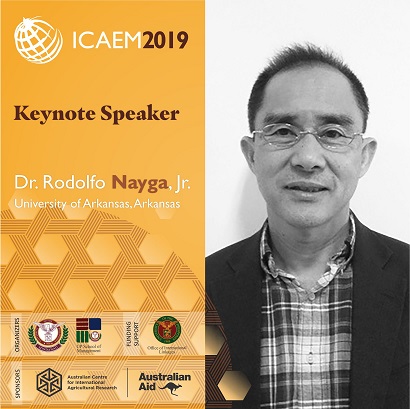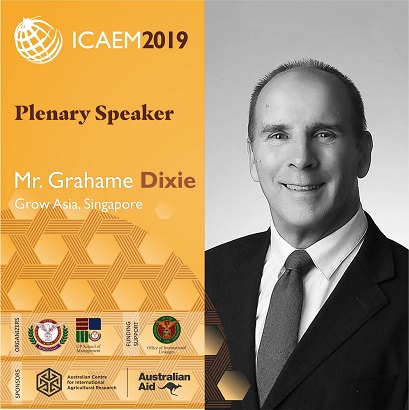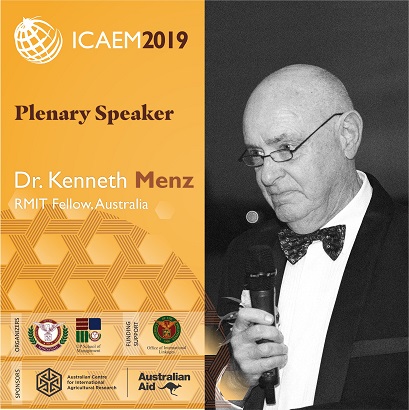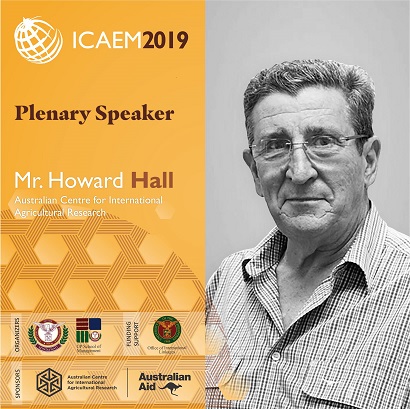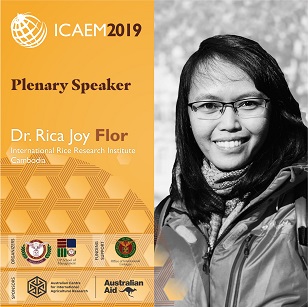The keynote and plenary speakers in the 9th International Conference on Agribusiness Economics and Management, 13-15 November 2019
Professor Rodolfo M. Nayga Jr.
Prof. Nayga is the Distinguished Professor and Tyson Endowed Chair in Food Policy Economics and Agribusiness at the University of Arkansas, United States. He received his PhD in agricultural economics from Texas A&M University, MS from University of Delaware, and BS in agribusiness economics from the University of the Philippines Los Baños (UPLB). His research interests include the economics of food consumption, policy, and health. Prior to joining the University of Arkansas, he was a professor at Texas A&M University for twelve years and was a faculty member at Rutgers University, United States, and at Massey University, New Zealand. He has published more than 250 refereed articles in several economics, behavioral science, marketing, and public health journals. Prof. Nayga worked with other universities such as Korea University, Norwegian Institute of Bioeconomy Research, Zhejiang University, Waseda Institute of Advance Studies, Wageningen University, and the Institute of Global Food Security, Queen’s University Belfast
Mr. Grahame Dixie
Mr. Dixie is the executive director of Grow Asia, a multi-stakeholder partnership platform that catalyzes action on inclusive agricultural development in Southeast Asia. The platform convenes governments, farmers, nongovernment organizations, and other stakeholders to co-create value chain initiatives focused on smallholder farmers and environmental sustainability of agriculture. Mr. Dixie brings over thirty-five years of professional experience as a practitioner of agricultural development in over seventy-five countries, including an early career in the private sector. For the past decade, he served as the World Bank’s lead agribusiness advisor where he was involved in the design and review of the World Bank’s portfolio of projects linking smaller scale farmers to markets and agribusinesses. These programs leveraging public and private investment involved innovative financing and research on key issues. His work included advising World Bank teams globally on project design, emerging good practices, and key trends in the food and farm sector, with a focus on market-oriented farming and multi-stakeholder partnerships. More recently, he has served as an advisor to the Bill and Melinda Gates Foundation and the International Fund for Agricultural Development.
Dr. Kenneth Menz
Dr. Menz began his career as an agricultural scientist before spending the bulk of his working life as an agricultural economist. He specialized on the interface between agricultural science and economics from a range of perspectives (e.g., farming systems research, evaluation of agricultural research, factors affecting agricultural productivity, social science). He spent twenty years as research program manager for the Australian Centre for International Agricultural Research (ACIAR), where such a multi-disciplinary orientation proved valuable. He has worked for universities (Queensland, Minnesota, RMIT), government agencies (Australian Bureau of Agricultural Economics), international agencies (IITA, Nigeria), and he spent six years undertaking graduate work in the United States. Since “retiring” from ACIAR ten years ago, he continued engagement in head office consultancies as well as via active research roles in ACIAR research projects in Vietnam and the Philippines. Dr. Menz’ notable publications are in weed control economics and impact assessment.
Mr. Howard Hall
Mr. Hall is the research program manager for agribusiness in the Australian Centre for International Agricultural Research (ACIAR). He finished a bachelor of applied science (rural technology) from the University of Queensland and a graduate diploma of business studies from the University of New England. Prior to joining ACIAR, he founded and operated a specialist agribusiness consultancy for almost thirty years, working across tropical and temperate horticulture, intensive and extensive meat and seafood industries, grains, pulses and field crops, food packaging and processing. He has also worked as a senior manager in corporate agribusiness in the agricultural inputs sector and in both food manufacturing and food and grocery distribution. Mr. Hall has worked across North and Southeast Asia, Papua New Guinea, and the Pacific.
Dr. Rica Joy Flor
Dr. Flor is a postdoctoral fellow of the International Rice Research Institute (IRRI) and Wageningen University, the Netherlands (Wageningen University Postdoc Talent Program). She received her bachelor of arts in anthropology (cum laude) and master of arts in anthropology from the University of the Philippines Diliman. She got her PhD in social science (innovation studies) from Wageningen University where she was on a Global Rice Science Scholarship from IRRI. Dr. Flor has relevant experiences in applied social science research on technology adoption and innovation, impact assessment of technology change in agricultural innovation systems, and facilitating multi-stakeholder processes in agricultural research for development (AR4D) in Southeast Asian countries such as Bangladesh, Cambodia, Indonesia, Lao PDR, Myanmar, the Philippines, Thailand, and Vietnam. See the video here: https://drive.google.com/file/d/1DRZY7uonW8rx3zDFszMKoTfyBdr765al/view?ts=5e181bc9
Synthesis of the talks by School of Management Dean Pedro Alviola IV:
"The keynote and plenary speakers in their talks don't give definitive answers to some of our present problems because research is a process of discovery and learning. For that, I find the talks envigorating and inspiring.
For Dr. Nayga who gave a talk on lab-produced meat, he motivated that major issues in the industry such as new and emerging diseases in commercially-imported livestock such as health risks or cardiovascular diseases, and that the agriculture sector especially the livestock sector is a major generator of greenhouse gasses in the world, there is impetus for developing sustainable technologies such as for example this lab-produced meat or in vitro meat that should be acceptable to consumers. They are predicated on the premise that consumers are willing to pay for these products. From the work of Dr. Nayga, there are insights that have been generated in terms of making sure that the information regarding these new technologies can be used by policy-makers and consumers in terms of the food labeling, food policies, and so on. It is important to communicate this information to consumers because consumers are key to making sure that these products will be produced in the market.
Mr. Grahame Dixie, in his talk, emphasized the inclusivity of value chains, because this can result in positive welfare and improved outcomes such as improvement in productivity, increased social benefits, with the goal of reducing poverty, increasing incomes, give better opportunities, and contribute to sustaining the environment.
Dr. Menz talked about the importance of social capital where members of the community can access skills, expertise, knowledge, and information so that both the individual and the commnity can take advantage of its benefits. He emphasized that the provision of social capital can lead to better outcomes and can increase access to nutritionally better and safe foods.
For Dr. Flor, her talk starts with a question. Why, despite the availability of integrated pest management packages, the farmer still heavily relies on pesticides? And she enumerated three reasons why. One, some people don't want to do that. Leave the insects alone. At the same time there are other policy imperatives such as food security which in the traditional sense increases the use of perticides for them to increase yield. Finally, there is a dearth of available technologies for possible alternatives towards methodologies or approaches that we use pesticides to control pests and diseases. Finally, she says there is a need to reconfigure the way we present incentives especially for alternative technologies to society and, much more importantly, there is a need to look at how acceptable these technologies are to farmers especially because farmers view these financial and technological constraints differently from the rest of us.
Mr. Hall, in his talk, asks why, in spite of the significant contribution of smallholder farmers in the agrifood system are they still disconnected from the commercial agrifood chain? He enumerated some of the weaknesses such as issues in land ownership, limited credit access, risk aversion to technologies, disconnected farm-to-market roads, low business skills, little political and social voice, and outdated and unsustainable production processes. But despite this, farmers have been identified as agents of social change. They have real access to land, they are local experts, have good work ethic, they are innovators, are efficient, and most importantly, they generate ideas. The question Mr. Hall says is there is a need to reconfigure all of these private and public partnerships, that everyone needs to be on board and for everyone to re-assess from time to time what the modality should be so everyone is going to be there. So, again, the talks do not give definitive answers, perhaps they give more questions, but, more importantly, they give a road map on how to address these challenges."
